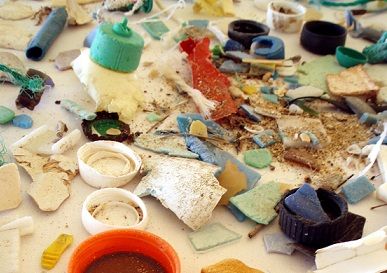The recent stories about microplastics and other plastic waste in the sea have led to people becoming aware of the problem and worrying about it, but the effects of all this plastic on animals and the environment are still not really understood.
In order to tackle the problem efficiently, more knowledge is needed, says Professer Torkel Gissel Nielsen from DTU Aqua. “It is reasonable enough to be worried, but we shouldn’t be afraid. Concrete research is needed to find out what it is we are seeing and how it affects the maritime environment,” he added.
Pooling their efforts
Researchers from five different Danish institutes have decided to combine their efforts to generate background data on the problem. The project will be led by Aalborg University’s marine plastics research centre and supported by the Velux Fund to the tune of 20 million kroner.
Tord Gissel Nielsen’s team will be monitoring plankton, fish and shellfish that eat microplastics and what happens when they do so. In addition, they will investigate whether the plastic’s size, composition and age plays a part in how it effects the ocean’s foodchain.
Old livestock breeds dying out
Despite state-sponsored efforts to the contrary, a number of old Danish breeds of cows and pigs are dying out. Experts warn that this is a problem because it means we lose the genetic building blocks to breed new animals that may have a better chance of survival in the face of changes to the environment and climate. Amongst the breeds in peril are the red cow and bacon pig, which until a couple of decades ago, were cornerstones of Danish agriculture, reports TV2 Nyheder. Associate professor Bernt Guldbrandtsen from the institute for molecular biology and genetics at Aarhus University said that “what remains of the old breeds look to be in jeopardy if we don’t take active steps now, especially when we’re talking about pigs and cows. There are simply too few male animals.” He went on to add that there is also a need for more breeders, as many of them are getting old.
Pesticides spraying ban near wells
The environment and food minister, Jakob Elleman-Jensen, has had second thoughts when it comes to how best to protect drinking water supplies from pesticide residues. He has summoned the parties who agreed on new pesticide regulations last year for further negotiations. Back in August the opposition parties were advocating a ban on spraying near to drinking water borings, but at that time the minister felt that this would be encroaching on private property, reports BT. Now he has changed his mind. “I worry when I hear on the radio that pesticide residues have been found in the water in this place and that place,” he said. “As a consequence, I now wish to ban spraying near borings, because in this way we can reduce the risk significantly.” It is envisaged that a scheme will be developed to compensate farmers for the area that they will not be able to spray and thus utilise for crops.
Major salmonella outbreak
The Danish state serum institute is trying to trace the source of a salmonella outbreak that so far has affected 33 people. When first announced on December 5, it was revealed that 28 people across Denmark had been located, but since then numbers have increased. The institute is convinced that the source of the outbreak is pork, but so far it has not been possible to isolate the exact cause, reports TV2 Nyheder. Symptoms of salmonella include diarrhoea, vomiting and generally feeling under the weather.
More parcels, more cardboard
Figures from the Miljøstyrelsen environmental authority reveal that the amount of cardboard being used in Denmark has doubled over six years. From 2010-2016 the amount used per household has gone up from 16 to 36 kilos. In 2017, almost 100,000 tonnes of the stuff was collected from private houses – all of which potentially could be recycled. One of the reasons appears to be that Danes are increasingly ordering things on the internet that are delivered by post, reports TV2 Nyheder. PostNord expects to deliver over 500,000 parcels next Tuesday, which is the busiest day of the year.
















